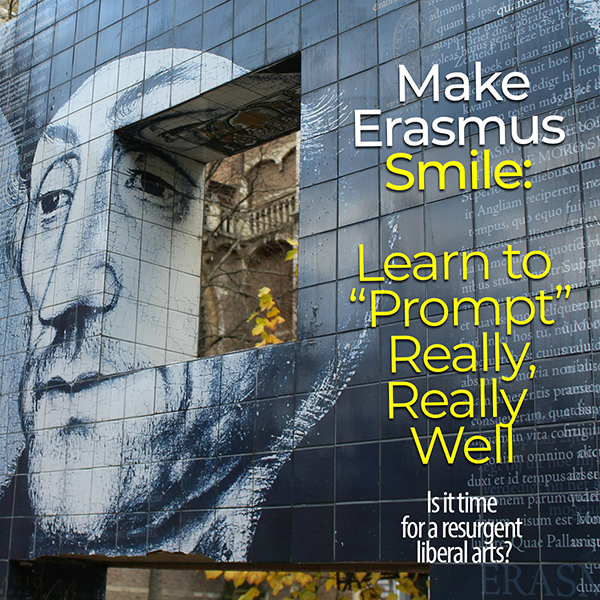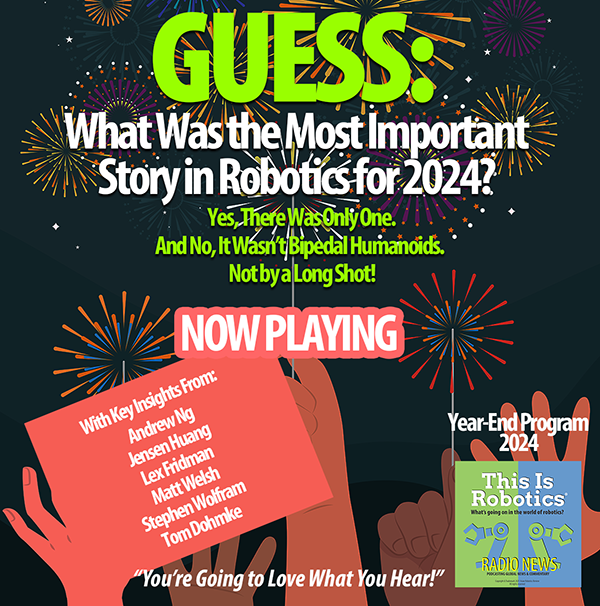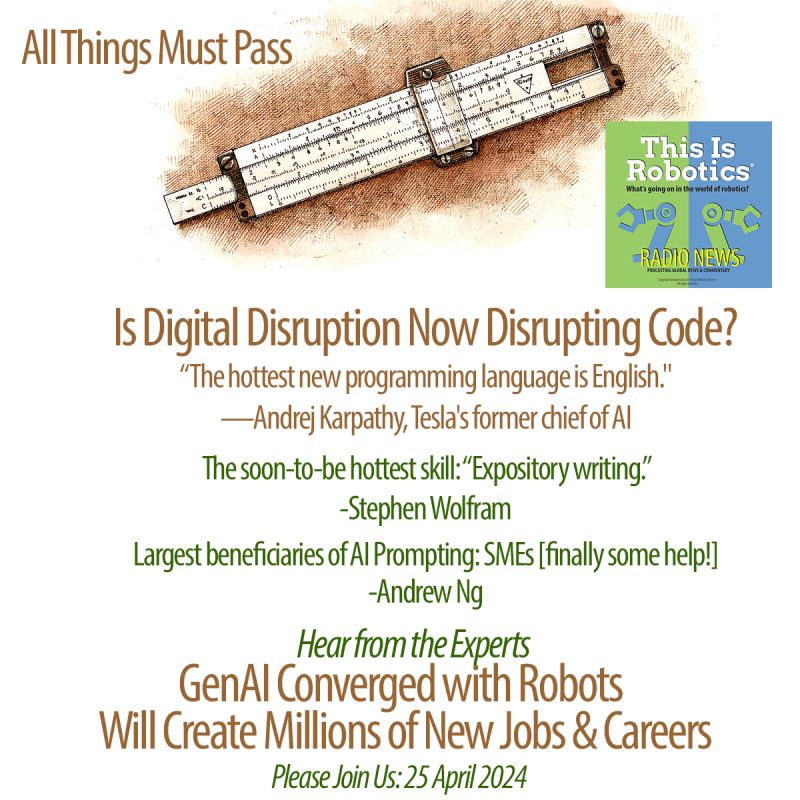Did AI
Just Free
Humanity
from Code?

After humans wrote code for 75 years, are machines now suddenly learning to speak our language instead?
The Most Important Story in Robotics for 2024
Maybe AI took pity on us after all the years bearing witness to humanity’s struggle with programming languages. Tantalized by fourth-generation program languages like Python, we could glimpse the language within but just couldn’t make the final jump to no code on our own.
Now it’s been done for us. NVIDIA’s Jensen Huang put the stamp of approval on AI prompts while holding aloft the Blackwell GPU with 208 billion transistors. “Now we can even talk to warehouses,” he beamed to a full house of cheering supporters at NVIDIA’s annual meeting.
Suddenly this March, we all woke up one morning to find code fighting for its life. Why so fast? Why so suddenly? Why so completely? Unexpectedly and quietly code is disappearing. Why is that? Is AI’s argument that convincing? Sure seems that way. It was a little like the Berlin Wall: imposingly there for a few decades, then suddenly gone and forgotten.
In a talk titled, “If Computer Science Is Doomed, What Comes Next?”, Matt Welsh delivered his “goodbye to coding” talk at Harvard.

Here’s a mere nine-minute video clip (over an hour here) from Harvard during his guest lecture: “Welsh has also been a former principal engineer at both Google and Apple — and also a former Harvard professor of computer science. But he’d arrived to confront the students with a fresh perspective — or with some harsh truth.
“After fifty years of programming,” he humorously informed the students, “we humans still suck at it. And I don’t think another fifty years is going to solve it.”
Soft Skills, Hard Truth: Reinventing Liberal Arts Education in the Age of AI
How Liberal Arts Will Stay Relevant in the Age of AI
Here’s an excerpt:
It seems like AI is destroying the employment prospects of those with STEM backgrounds. When pitted against the unrelenting quantitative juggernaut, a new crop of interdisciplinary graduates equipped with strong thinking, communication, and creative skills will be essential.
We could lift the value of the liberal arts degree and change perceptions if we made radical changes.
Thinking and Problem Solving Complementing AI
The liberal arts’ emphasis on critical thinking, problem solving, and adaptability will be invaluable in a labor market that is rapidly evolving due to AI.
Successful graduates will be able to tackle difficult problems, come up with creative answers, and master the art of utilizing artificial intelligence.
Coursework across disciplines like philosophy, literature, and the social sciences teaches students how to think critically, question assumptions, and develop creative solutions.
Unlike vocational programs focused on today’s job skills, the liberal arts provide the dexterity of thought needed to adapt and stay relevant as AI reshapes occupations.
With whole categories of jobs disappearing while new ones emerge, successful workers must have human skills like conceptual thinking, communication, and prproblem-solving that machines cannot replicate.
Far from an impractical indulgence, the study of the liberal arts fosters the mental agility needed to reinvent oneself amidst AI-driven disruption.
So while technical fields may appear to be the safer path, the inherently human capabilities developed by the liberal arts offer lasting labor market resilience.

What happens when digital disruption knocks at the door of code?

Massive change?
What if two million liberal arts grads started AI prompting? Advantaged by thinking critically, reasoning across disciplines, questioning assumptions, and sparking creativity, these dudes could well make an outsized impact on society, business, and industry through the use of AI prompting. By taking on tens of thousands of tasks heretofore never attempted with AI, they could become change agents of mega proportions.
Hopefully, change for the better.
Here’s an excerpt:
Matt Candy, global managing partner in generative AI at IBM, believes the jobs of the future will be filled by those who can work with AI using language and creative thinking nurtured in liberal arts degrees.
But the skills demanded of the workers hired to herald in that future aren’t necessarily going to be focused on the ability to fly through code or know their way around a circuit board.
Instead, Candy thinks those who fundamentally understand language and how to apply it could be in line for high-paying jobs related to AI.
“Rather than us having to learn to talk the language of technology and programming computers, effectively they’re learning to talk our language,” said Candy..
Candy was mainly referring to a jump in demand for the role of prompt engineers, where employees feed large language models (LLMs) like ChatGPT and Bard prompts, questions, and information to train it up in human behavior and thinking.
As language models like ChatGPT face challenges in accuracy and may produce false information—known as “hallucinations”, the need for individuals with a strong grasp of language to train and interact with chatbots becomes more apparent.
Right-brainers in demand
Candy also thinks demand for creative thinkers and graduates of liberal arts courses could broadly become higher than ever thanks to AI.
Candy explained there is now a democratization of skills taking place in the tech world, lessening the importance of technical workers and increasing demand for right-brainers.
“Questioning, creativity skills, and innovation are going to be hugely important because I think AI’s going to free up more capacity for creative thought processes.
“The speed at which people will be able to come up with an idea, to test the idea, to make something, it’s going to be so accelerated. You don’t need to have a degree in computer science to do that.”
The proliferation of other AI software, like Dall-E, also means creative processes like graphic design will increasingly be the domain of people with ideas rather than those who spent years honing their technical skills.
“You’re going to be able to take on the role of a designer. You don’t need to be a graphic designer and have an art degree to do these things,” said Candy.
There will of course still be a big place for computer scientists.
“The world is being rewritten in code,” Candy says, as industries everywhere from automotive to oil and gas digitize and put new systems in place to take advantage of AI.
But once those systems are in place, Candy says, the creative thinkers may hold an advantage.
It tracks with research conducted into workplace personalities by Slack and polling company YouGov.
Dr Lynda Shaw, a business psychologist involved in the study, suggested workers with a higher emotional intelligence were more likely to become the CEOs of tomorrow’s AI-focused business landscape.
